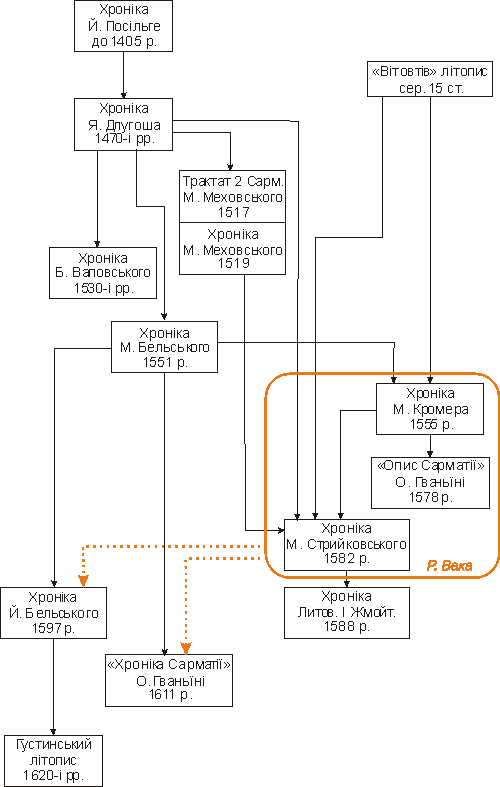Fabulous "Vytautas march on the Don"
Nicholas Zharkikh
Unlike the real campaign on Vorskla river in 1399, "Vytautas march on the Don" was not mentioned in either the source contemporary to the "event." In particular, completely silent about it the Lithuanian ("Vytautas" chronicle) and Great-Russian (Trinity, Rogozhsky, Simeon, Sofia 1st chronicles) sources.
In previous article I examined the communication of the German chroniclers late 14th century and I found that they fed information contemporary to events themselves, but limited to a small competence of informants. These reports said Vytautas had run campaigns against the Tatars on the Dnieper.
How arose the legend of the march on the Don?
Jan Dlugosz (1470s)
Maciej Miechowita (1519)
Bernhard Wapowski (1530s)
Martin Belsky (1551)
Martin Kromer (1555)
Alexander Guagnini (1578)
Matthew Stryjkovsky (1582)
Joachim Belsky (1597)
A. Guagnini – M. Paszkowski (1611)
Gustynsky Chronicle (1620s)
The origin of the legend
We can see, that stemma our stories is simple:

Stemma "campaign Vytautas on the Don"
We need to clearly separate the recording J. Posilge, that are contemporary by the events, of later treatments themes given by him. I do not see any reason to doubt the reliability of the records of the Prussian chronicler. But he did not mention any Don!
Poor records J. Posilge served as a pretext for an extended narrative J. Dlugosz, where appears for the first time Don as the main geographical landmark campaign. Most of the descriptions of the episode under consideration, directly or indirectly comes from J. Dlugosz, less – on "Vytautas" chronicle, and in part of the "campaign" there is a misunderstanding when borrowing.
Collected texts clearly show that the starting point here was the information about the Lithuanian Tatars – contemporaries Dlugosz. He pondered the question – where did the Tatars in Lithuania, and added the event to the time of Vytautas, using the reference in Posilge.
We know that after 1395, after the defeat in the Battle of the Terek, Khan Tokhtamysh always failed, during which he fled to Lithuania. This time one can be estimated date of start emigration of Tatars in Lithuania, which apparently continued in several waves to the middle of the 15th century. The Tatars were resettled in Lithuania freely, Lithuania never wins any military victories over the Tatars to capture mass of prisoners.
To submit this case possible to honor Vytautas, it was coined by his winning campaign for Don (or even beyond the Volga), capture of prisoners and withdrawal them to Lithuania.
Tatars themselves, as we have seen, explained the matter more honorable to themselves, and, in my opinion, more realistic. Oblige the military service, and even more give villages and exempt from other duties – as can be drawn from the free men, not with captive enemies.
So, while not deny the reality of Vytautas campaigns in 1397 and 1398, respectively, we should consider as later fiction his march to the Don or the Volga.
Historiography
Alexander Barbashov (1885); Michael Zhdan (1930); Stephen Kuczynski (1935); Mohammed Safargaliev (1960); Felix Shabuldo (1987, 2001, 2003); Jaroslav Dashkevich (2004); Boris Cherkas (2015); Jaroslav Pilipchuk (2015).
In general, the most sober and rational views expressed M. Zhdan and J. Pilipchuk, but in these studies one did not see what should have been the basis of each study – source analysis. The list of texts on the subject – it is not a source of analysis.
Kiev, 22 January – 11 February 2017.
Full text of article – in the Ukrainian version.
